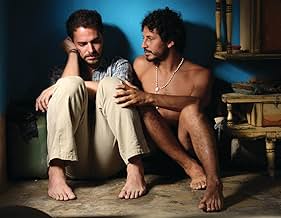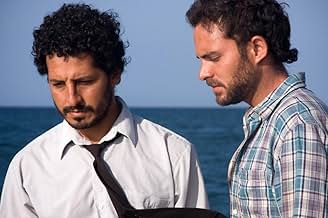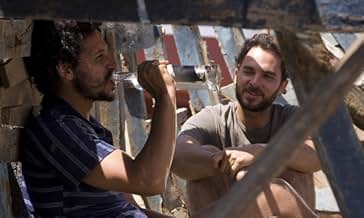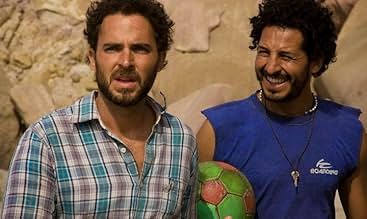Undertow
Original title: Contracorriente
- 1h 37m
IMDb RATING
7.7/10
7.6K
YOUR RATING
An unusual ghost story set on the Peruvian seaside; a married fisherman struggles to reconcile his devotion to his male lover within his town's rigid traditions.An unusual ghost story set on the Peruvian seaside; a married fisherman struggles to reconcile his devotion to his male lover within his town's rigid traditions.An unusual ghost story set on the Peruvian seaside; a married fisherman struggles to reconcile his devotion to his male lover within his town's rigid traditions.
- Director
- Writer
- Stars
- Awards
- 13 wins & 13 nominations total
Humberto Cavero
- Padre Juan
- (as Julio Humberto Cavero)
Liliana Alegría
- Carlota
- (as Liliana Alegria Saavedra)
Tomas Fernandez
- Sabino
- (as Tomás Fernández)
- Director
- Writer
- All cast & crew
- Production, box office & more at IMDbPro
7.77.5K
1
2
3
4
5
6
7
8
9
10
Featured reviews
Love, Magic and Cristian Mercado
Profoundly moving. A fishing village that seems to come out of somebody's dream. A loving husband about to become a father and a forbidden love. Cristian Mercado in a beautifully drawn performance takes us into his own predicament with honesty and astonishing tenderness. The emotional details of his love for another man are nothing short of extraordinary. I saw the film a couple of day ago at The Latino Film Festival of Los Angeles and Cristian Mercado's face has been with me ever since. Born and bread in a deeply religious Peruvian community, he accepts his feelings but denies the truth of his own nature. Being a man of unshakable, even if unconscious, integrity he will be who he's suppose to be, with courage an kindness. I must confess, I wept. Glad to know it got an American distribution. It deserves to be seen. Congratulations.
A beautiful, unique and creative film, and one of the most rewarding experiences I've had at a feature film in a long time!
One of the best new films exploring gay male identity, love and relationships, and likely will be a worthy addition to many personal "favorite gay films" lists, although the fact that the film is set in a town, and to some extent a culture, where, at least for a large part of the story, many in the town have not yet evolved in their views of LGBT people and issues, created some (ultimate unnecessary) anxiety for me early in the film, and at parts throughout, as to whether the film would be a throwback to older, more stereotyped and limited representations and stories of gay life, although those anxieties were not only relieved by the end of the film, but, as I suggested, the film is an extremely valuable addition to the new wave of gay cinema.
The writer, director, casting director and cast, cinematographer, set designer and other members of the film-making team also do a great job exploring rural, small town life, with its traditions (religious and otherwise...) superstitions, and class differences, and the interplay among the individuals, families and community who inhabit the town, along with the welcome (or rejection...) given to a stranger who comes there, and who many perceive as a threat to the social fabric of the town, and the support (or lack of it...) the townspeople and characters show to each other, ultimately examining the struggle between bigotry and ignorance, on the one hand, and the struggle to overcome that bigotry and ignorance, and replace it with support, respect and love on the other. Most of the townspeople are not financially well-off, but make just enough to get by, working in occupations connected to fishing and the sea, and the way they relate, individually and as a community, to each other (and to themselves, in regard to what is the true definition of a man, of an individual's self-respect) in light of a newcomer who is more financially well-off, and his artistic and suspected sexual/relationship interests, are additional themes of the film, which play out so well in a beautiful, interesting and captivating way, often evoking strong emotions, and at times offering an inspiring catharsis (and perhaps a few tears, in reaction to some sadness, and much beauty.)
And there are many other highlights of the film beyond all that, including the amazingly beautiful setting, in a rural, seaside Peruvian village, the cinematography, musical score, performances, plot twists and turns, the mix of fantasy and reality (and moments where it's unclear to what extent fantasy exists as an aspect of the story's reality.) This is a truly unique and creative film, and one of the most rewarding experiences I've had at a feature film in a long time.
The writer, director, casting director and cast, cinematographer, set designer and other members of the film-making team also do a great job exploring rural, small town life, with its traditions (religious and otherwise...) superstitions, and class differences, and the interplay among the individuals, families and community who inhabit the town, along with the welcome (or rejection...) given to a stranger who comes there, and who many perceive as a threat to the social fabric of the town, and the support (or lack of it...) the townspeople and characters show to each other, ultimately examining the struggle between bigotry and ignorance, on the one hand, and the struggle to overcome that bigotry and ignorance, and replace it with support, respect and love on the other. Most of the townspeople are not financially well-off, but make just enough to get by, working in occupations connected to fishing and the sea, and the way they relate, individually and as a community, to each other (and to themselves, in regard to what is the true definition of a man, of an individual's self-respect) in light of a newcomer who is more financially well-off, and his artistic and suspected sexual/relationship interests, are additional themes of the film, which play out so well in a beautiful, interesting and captivating way, often evoking strong emotions, and at times offering an inspiring catharsis (and perhaps a few tears, in reaction to some sadness, and much beauty.)
And there are many other highlights of the film beyond all that, including the amazingly beautiful setting, in a rural, seaside Peruvian village, the cinematography, musical score, performances, plot twists and turns, the mix of fantasy and reality (and moments where it's unclear to what extent fantasy exists as an aspect of the story's reality.) This is a truly unique and creative film, and one of the most rewarding experiences I've had at a feature film in a long time.
Remarkable--MUST SEE
This film was the "buzz film" at Frameline, the San Francisco LGBT film festival. It is now in very limited commercial release. I saw it for the second time this week and it's as powerful on the second viewing as the first. It's beautifully filmed in a stunningly picturesque Peruvian fishing village. It features tender and complex performances by the actors in the lead roles, and wonderful authentic performances by native residents of the village location. The story delivers a powerful study in internal conflict, grief, redemption, and the power of love. The director says that the idea for the story came from a screen writing-class assignment to write a scene that happens in a kitchen. The kitchen scene is indeed pivotal to the story, but the moral intricacy of the tale surrounding that scene is testament to a creative genius that you will want to hear more from. You will want to see this film again, and you will want your friends to see it, because the world needs more filmmakers like this.
Undertow: Undeservedly Under The Radar
In early 2010, the first Peruvian film ever nominated for a Foreign Language Film Oscar -- "Milk Of Sorrow" (2009) -- got a U.S. 2-screen release that grossed all of 10K. Clearly UNDERTOW has no Peruvian coattails to ride in on. Despite Sundance kudos and buzz, it's already being ghettoized as a gay film. Yet it clearly is so much more. UNDERTOW doubly violates that genre's political correctness: the lead is both closeted and heroic while the captivating tale constantly eschews white/urbane predictability. We watch two more curve balls being thrown at us as well: next-world fantasy and 3rd world folklore. So this is definitely not "'Brokeback Mountain' meets 'Ghost'" as several critics have written it off in facile reviewer shorthand. But UNDERTOW may well have the power to connect with portions of the mainstream audiences for both of those films -- via word of mouth, curiosity-building press and guerrilla marketing. Our unexpected attraction to a real-life subsistence-poor fishing village and its close-knit, tradition-bound "primitive" citizens are seamlessly woven into the film's cast as well as fabric. Breath-taking cinematography, a script illuminating characters rather than telescoping plot, understated yet powerful performances and a hypnotic world music soundtrack take UNDERTOW far beyond the shorelines of dry-docked movie-making. Many high-concept films have dealt with men forced to choose between family and lovers. Others have pitted unlikely heroes against the mores of society. Nor is a quest to carry out the final wishes of the dearly departed at all innovative. But UNDERTOW combines these themes in a way no writer- director has done before. First-timer Javier Fuentes-León does so with fearless honesty and sublime-on-a-shoestring craft. No surprise then that it's this year's Foreign Language entry from Peru.
Hauntingly beautiful movie!
Contracorriente (Undertow) is simply a gem of beautifully shot pictures, perfectly cast actors, an extraordinarily well written script and masterful direction.
I did not initially expect Contracorriente to be a movie that would haunt me for days after watching it, as it seemed to be a perfectly straight forward story judging from the text on the back of the DVD-case. I was even a bit worried that it might be cliché or simply cheesy. It was not however. Not more than a few minutes into the movie I started to suspect that I might have grossly misjudged the nature of the film and I was happy to be proved wrong.
The locations, the people, the acting, the language were all so beautiful and the very delicate and slowly evolving story made for so much more than simple entertainment. Especially the subtle hint of possibility in the ending left a very warm and hopeful feeling but the movie as a whole makes a very strong and lasting impression.
I was very moved by this movie and the very strong statement that it makes and a variety of the most beautiful and strong scenes have stayed in my thoughts for days on end for both the sad parts and the joyous moments.
I can only recommend that you watch it if you haven't already - and I am looking forward to seeing it again soon myself and expect it to be something that I will do more than once.
I did not initially expect Contracorriente to be a movie that would haunt me for days after watching it, as it seemed to be a perfectly straight forward story judging from the text on the back of the DVD-case. I was even a bit worried that it might be cliché or simply cheesy. It was not however. Not more than a few minutes into the movie I started to suspect that I might have grossly misjudged the nature of the film and I was happy to be proved wrong.
The locations, the people, the acting, the language were all so beautiful and the very delicate and slowly evolving story made for so much more than simple entertainment. Especially the subtle hint of possibility in the ending left a very warm and hopeful feeling but the movie as a whole makes a very strong and lasting impression.
I was very moved by this movie and the very strong statement that it makes and a variety of the most beautiful and strong scenes have stayed in my thoughts for days on end for both the sad parts and the joyous moments.
I can only recommend that you watch it if you haven't already - and I am looking forward to seeing it again soon myself and expect it to be something that I will do more than once.
Did you know
- TriviaAlthough both main characters are Peruvian, the actors who play them are not. Cristian Mercado (the Fisherman) is Bolivian and Manolo Cardona (the Photographer) is Colombian.
- ConnectionsFeatures Direito de Amar (1987)
- How long is Undertow?Powered by Alexa
Details
- Release date
- Countries of origin
- Official sites
- Language
- Also known as
- Mối Tình Đồng Tính Lạ Lùng
- Filming locations
- Production companies
- See more company credits at IMDbPro
Box office
- Gross US & Canada
- $108,620
- Opening weekend US & Canada
- $6,749
- Sep 19, 2010
- Gross worldwide
- $602,059
Contribute to this page
Suggest an edit or add missing content




























